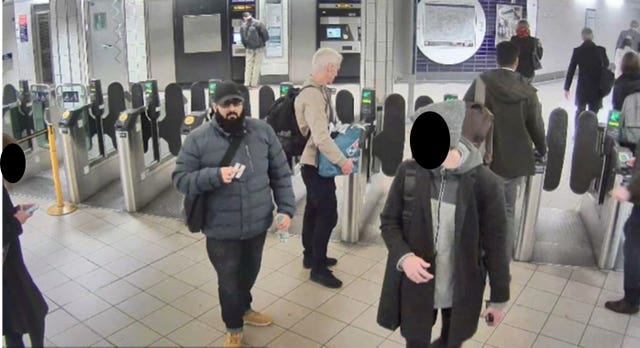I was unaware of MI5’s interest in Fishmongers’ Hall killer – probation officer
The probation officer for Fishmongers’ Hall attacker Usman Khan said he was unaware MI5 had an open investigation into the convicted Stafford terrorist, an inquest jury has heard.

Ken Skelton was responsible for assessing Khan’s risk of reoffending, which he described as “low” in an official report compiled days before the 28-year-old struck on November 29, 2019.
Mr Skelton said it would have made a difference in his report had he known the security services were concerned Khan was “continuing to radicalise Muslim prisoners, and was planning an attack”.
More:
An extremism risk guidance (ERG) report into homegrown jihadi Khan, written by Mr Skelton but not yet finalised, also downgraded Khan’s perceived skills to launch an attack as low.
The report was prepared around the time Staffordshire-raised Khan was planning his attack at a celebration event in central London for prison education programme Learning Together, on which he had enrolled while serving an eight-year prison sentence.

He struck after travelling unaccompanied from Stafford and then arming himself with knives and a fake suicide belt. He fatally stabbed Learning Together associates Jack Merritt, 25, and Saskia Jones, 23, who were guests at the event.
In his 2019 ERG report, Mr Skelton summarised: “I would assess Mr Khan’s likelihood of reoffending (and) risk of extremist offending is low.”
Nick Armstrong, counsel to Mr Merritt’s family, described the ERG as “just hopeless” and inaccurate, during the inquests into the deaths, at City of London’s Guildhall on Thursday.
Mr Skelton replied: “I did that document, what I was asked to do, and I put every effort into doing that.”
Mr Armstrong said MI5 updated Khan from priority level P4 to P3, and he was assessed at the point of his release from prison in December 2018 that he continued to pose a risk to the public.
Mr Armstrong said: “If that had been known, it would have twitched your antennae.”
Mr Skelton replied: “Certainly.”

Mr Armstrong said MI5 was concerned Khan was continuing to radicalise Muslim prisoners, and was planning an attack.
Mr Skelton said he was unaware of that intelligence, adding: “I had not heard that, if I had the whole management process would have altered potentially.”
He also said he was not aware of any MI5 personnel attending Mappa (multi-agency public protection arrangements) meetings at which Khan was discussed.
Mr Skelton said he attended 29 of 30 Mappa meetings.
MI5 has yet to give evidence at the inquests.

Mr Skelton previously told the inquests he was not sceptical of Khan in the months leading up to his release from prison, despite claims the jihadi was planning to return to terrorism.
Mr Skelton said: “In terms of his behaviour, outwardly it was positive but at no point did I forget the negative reports we have been receiving for months and over the time of his custodial sentence.”
Mr Skelton worked for the probation service for 30 years, and had been assigned to Khan for around 18 months before the Fishmongers’ Hall attack.
He was asked by Kevin Baumber, counsel for four officers from Staffordshire Police, whether he was “surprised” to learn that Khan, with whom he had weekly contact, was responsible.
Mr Skelton replied: “Very surprised. Astounded.”
During a break at the central London function, Khan went into a toilet cubicle, strapped two kitchen knives to his hands and began stabbing delegates including Ms Jones and Mr Merritt.
The pair bled to death, while three others were injured in the attack.
Three people chased Khan, who was wearing a fake suicide belt, from the building armed with a fire extinguisher and a narwhal tusk.
Khan was then fatally shot by police on nearby London Bridge.
Khan, who was originally from Stoke, was living at flats on Wolverhampton Road, Stafford, before the attack. He was released from prison on licence in December 2018, halfway through a 16-year prison sentence, after he was convicted of terror offences in February 2012.
The inquests continue.





